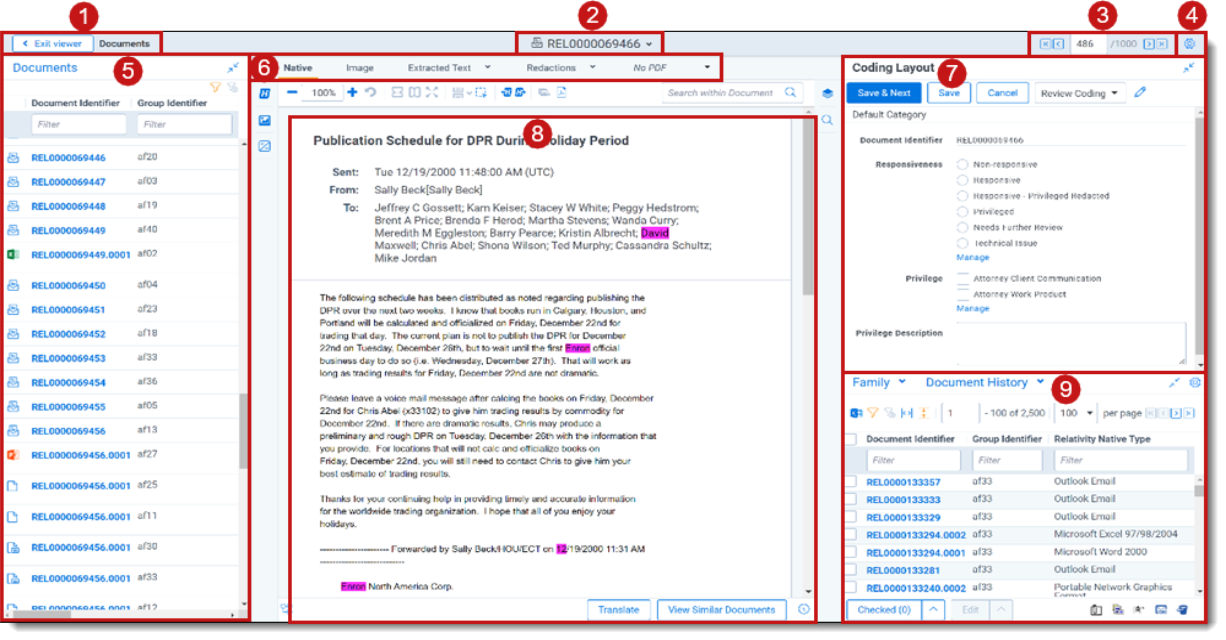
Relativity Assisted Review: Complete Buyer's Guide
Enterprise-grade AI-powered eDiscovery platform
Relativity Assisted Review is an enterprise-grade AI-powered eDiscovery platform that combines traditional predictive coding workflows with generative AI capabilities to automate document review for complex litigation and regulatory investigations. The platform leverages Simple Passive Learning (SPL) methodology where attorneys pre-select training documents, providing greater control over AI training processes compared to fully automated continuous learning systems[33][56].
Market Position & Maturity
Market Standing
Relativity operates as a foundational platform in the AI-powered eDiscovery market, competing directly with enterprise solutions like Everlaw while serving large-scale legal matters requiring defensible document review automation[54][56].
Company Maturity
Comprehensive platform capabilities and established customer base handling complex federal investigations and large-scale commercial litigation demonstrate operational scale and stability for enterprise deployments[49][56].
Growth Trajectory
The platform's positioning within the 29% market share that eDiscovery represents in legal AI applications suggests continued growth potential as organizations adopt AI-assisted review methodologies[44][45][48].
Industry Recognition
Integration partnerships and ecosystem positioning within legal technology infrastructure. Recent integration of Azure OpenAI technology through aiR for Review demonstrates continued innovation and strategic technology partnerships[54].
Strategic Partnerships
Integration of Azure OpenAI technology through aiR for Review demonstrates strategic technology partnerships[54].
Longevity Assessment
Established customer relationships, comprehensive platform capabilities, and strategic technology partnerships support continued operation[54][56].
Proof of Capabilities
Customer Evidence
Financial services firms handling federal investigations, energy companies managing commercial litigation, and legal service providers optimizing multi-custodian reviews demonstrate proven capability across different matter types and organizational contexts[49][53][56][59].
Quantified Outcomes
Law In Order case study documented 97% reduction in manual review volume, reducing document review from 157,000 to 5,243 documents with reported savings of $285,000 AUD compared to linear review[53].
Case Study Analysis
CDS Legal's case study illustrates how strategic training data management significantly improved implementation outcomes by combining seed sets from prior custodians to accelerate new custodian reviews[59].
Market Validation
The platform's documented success in federal investigations and large-scale commercial litigation demonstrates market acceptance for enterprise deployments requiring defensible AI-assisted review[49][53][56].
Competitive Wins
While specific retention rates aren't disclosed, customer case studies spanning financial services, energy, and legal services sectors indicate diverse industry adoption[49][56].
Reference Customers
Documented implementations include financial services firms handling federal investigations, energy companies managing commercial litigation, and legal service providers optimizing multi-custodian reviews[49][53][56][59].
AI Technology
Relativity Assisted Review delivers document classification and prioritization through two complementary AI approaches that provide organizations flexibility in deployment methodology. The traditional assisted review workflow utilizes seed document integration, leveraging pre-coded documents to train predictive models for relevance scoring[49][56][59].
Architecture
Architecture and deployment center on workflow flexibility and scalability for complex, large-volume matters. The platform supports prioritization algorithms, non-responsive document exclusion protocols, and comprehensive quality control validation across diverse legal matter types[50][56].
Primary Competitors
Primary competitors include Everlaw for continuous active learning with automated F1 optimization, and SMB-focused platforms like Logikcull offering simpler automated privilege detection without extensive predictive coding requirements[11][50][52].
Competitive Advantages
Workflow flexibility and attorney control over AI training processes. The Simple Passive Learning (SPL) methodology provides greater control over training data compared to fully automated continuous learning systems[33][56][59].
Market Positioning
Enterprise focus on defensibility and compliance requirements. Relativity's documentation and defensibility protocols align with regulatory audit and legal challenge scenarios[58][60].
Win/Loss Scenarios
Relativity excels for mid-market to enterprise organizations managing complex, high-volume matters requiring defensible AI-assisted review[58][60].
Key Features

Pros & Cons
Use Cases
Featured In Articles
Comprehensive analysis of AI Predictive Coding for Legal/Law Firm AI Tools for Legal/Law Firm AI Tools professionals. Expert evaluation of features, pricing, and implementation.
How We Researched This Guide
About This Guide: This comprehensive analysis is based on extensive competitive intelligence and real-world implementation data from leading AI vendors. StayModern updates this guide quarterly to reflect market developments and vendor performance changes.
60+ verified sources per analysis including official documentation, customer reviews, analyst reports, and industry publications.
- • Vendor documentation & whitepapers
- • Customer testimonials & case studies
- • Third-party analyst assessments
- • Industry benchmarking reports
Standardized assessment framework across 8 key dimensions for objective comparison.
- • Technology capabilities & architecture
- • Market position & customer evidence
- • Implementation experience & support
- • Pricing value & competitive position
Research is refreshed every 90 days to capture market changes and new vendor capabilities.
- • New product releases & features
- • Market positioning changes
- • Customer feedback integration
- • Competitive landscape shifts
Every claim is source-linked with direct citations to original materials for verification.
- • Clickable citation links
- • Original source attribution
- • Date stamps for currency
- • Quality score validation
Analysis follows systematic research protocols with consistent evaluation frameworks.
- • Standardized assessment criteria
- • Multi-source verification process
- • Consistent evaluation methodology
- • Quality assurance protocols
Buyer-focused analysis with transparent methodology and factual accuracy commitment.
- • Objective comparative analysis
- • Transparent research methodology
- • Factual accuracy commitment
- • Continuous quality improvement
Quality Commitment: If you find any inaccuracies in our analysis on this page, please contact us at research@staymodern.ai. We're committed to maintaining the highest standards of research integrity and will investigate and correct any issues promptly.